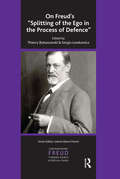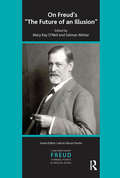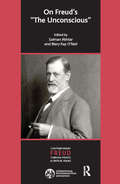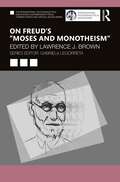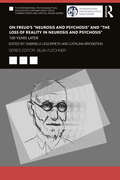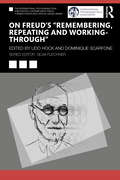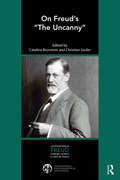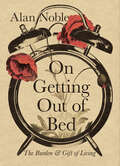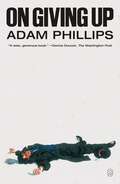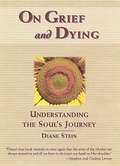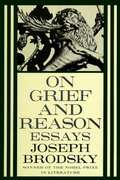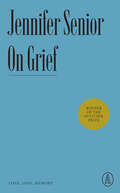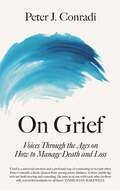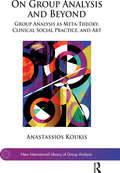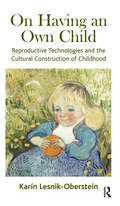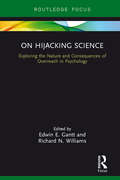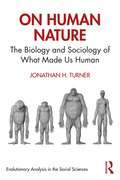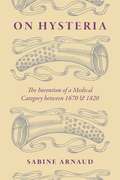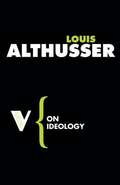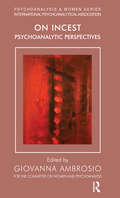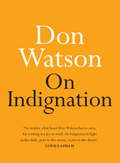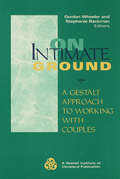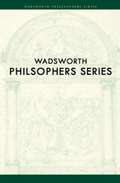- Table View
- List View
On Freud's Splitting of the Ego in the Process of Defence (The\international Psychoanalytical Association Contemporary Freud: Turning Points And Critical Issues Ser.)
by Thierry Bokanowski Sergio Lewkowicz Elias Mallet da Rocha BarrosThis book includes the development of the concept of "splitting" from both metapsychological and clinical perspectives, emphasizing the great importance of this topic for contemporary psychoanalysis. Starting with the history of the concept, the book covers recent French, English and Latin American theorizations on the theme. In regard to clinical approaches it presents the relationship between the "splitting" and complex clinical cases such as borderline, perverse and psychosomatic conditions. The book also includes aspects of "splitting" and virtual reality, as well as in traumatic situations: factors so important in contemporary life. The premise behind this work was to invite authors from different regions and orientations to promote a fruitful debate on the theme, thus enriching one of Sigmund Freud's most seminal concepts.
On Freud's The Future of an Illusion
by O’Neil Mary Kay Salman Akthar"The Future of an Illusion" reveals Freud's reflections about religion as well as his hope that in the future science will go beyond religion, and reason will replace faith in God. The discussion with an imaginary critic revealed his internal debate, mirroring the debate about this subject in the outside world. However, it also enlightens his way of thinking: deconstructing and constructing at the same time. This volume considers Freudian ideas and their implications today, while focusing on the contradictions and gaps in Freud's proposals. The question of the coexistence between religion and psychoanalysis, as well as the place of ideals, belief, illusion, and imagination - and, no less important, the benevolent and destructive aspects of religion - also come into play.
On Freud's The Unconscious: Turning Points And Critical Issues Series: On Freud's The Unconscious (Ipa Contemporary Freud)
by Salman Akhtar Mary Kay O’NeilIf there ever was one word that could represent the essence of Freud's work, that word would be 'unconscious'. Indeed, Freud himself regarded his 1915 paper 'The Unconscious' as central to clarifying the fundamentals of his metapsychology. The paper delineates the topographic model of the mind and spells out the concepts of primary and secondary process thinking, thing and word presentations, timelessness of the unconscious, condensation and symbolism, unconscious problem solving, and the relationship between the system Ucs and repression. Examining these proposals in the light of contemporary psychoanalytic theory as well as from the perspective of current neurophysiology and ethology, nine distinguished analysts take Freud's ideas further in ways that have implications for both psychoanalytic theory and practice.
On Freud’s “Moses and Monotheism”
by Lawrence J. BrownOn Freud’s "Moses and Monotheism" discusses key themes in Sigmund Freud’s final book, Moses and Monotheism, written between 1934 and 1939. The contributors reflect on the historical context of the time during which the book was written, including Freud’s mindset and his struggle to leave Austria to escape the Nazi regime, and investigate its contemporary implications and relevance. Drawing parallels with contemporary society, the chapters cover topics like historical truth, the effects of Nazism on Freud’s writing, Freud’s "relationship" with Moses, the transmission of trauma across generations, the origins and psychodynamics of anti-Semitism, Freud and Moses as leaders, and the notion of Tradition. This book also reflects on the stories of Moses and of Freud – the search of a people for a "Promised Land," the deep scars of slavery, and the struggle of a man to establish an ideology and ensure its continuity. On Freud’s "Moses and Monotheism" will be of great interest to all psychoanalysts and psychoanalytic psychotherapists. It will also be of interest to scholars investigating the nature of truth, and social scientists interested in the broader applications of Freud’s discussions of the nature of civilization.
On Freud’s “Neurosis and Psychosis” and “The Loss of Reality in Neurosis and Psychosis”: 100 Years Later (The International Psychoanalytical Association Contemporary Freud Turning Points and Critical Issues Series)
by Jacques BerlinerblauOn Freud’s “Neurosis and Psychosis” and “The Loss of Reality in Neurosis and Psychosis” explores these two key papers on the topics of psychosis and neurosis and their relationship to the unconscious and to reality.The contributors to this book approach these texts from both a historical and a contemporary point of view, highlighting their fundamental contributions and comparing Freud’s thoughts with modern psychoanalytic theory. The chapters demonstrate the ongoing richness of Freud’s work and his legacy by highlighting new ideas and developments and include both clinical vignettes and theoretical insight. The contributors also raise questions that deserve further study, about the understanding and treatment of psychosis in children, distinctions and similarities between autism and psychosis, and the way in which aspects of our rapidly changing world – social media, climate change, AI - influence the evolution of psychotic states.On Freud’s “Neurosis and Psychosis” and “The Loss of Reality in Neurosis and Psychosis” will be essential reading for psychoanalysts and psychoanalytically oriented clinicians in practice and in training. It will also be of interest to academics and scholars of psychoanalytic studies and to readers interested in how modern clinicians interpret Freud’s work.
On Freud’s “Remembering, Repeating and Working-Through” (The International Psychoanalytical Association Contemporary Freud Turning Points and Critical Issues Series)
by Dominique Scarfone Udo HockIn On Freud’s “Remembering, Repeating and Working-Through” international contributors from a range of psychoanalytic backgrounds reflect on this key 1914 paper.Each chapter considers an aspect of Freud’s original work, addressing both the theoretical and clinical dimensions of the paper and incorporating contemporary perspectives. Bringing out all three aspects of the paper’s title, the contributors consider the issues raised by the so-called change in psychoanalytic paradigm, from the classic central concern of remembering to a clinical experience which prioritises enactment and repetition. The reflections on this important paper demonstrate how it goes beyond technique to open new vistas on the conception of psychoanalysis as a whole.On Freud’s “Remembering, Repeating and Working-Through” will be essential reading for psychoanalysts and psychoanalytic psychotherapists in practice and in training. It will also be of interest to readers seeking a deeper understanding of current Freudian thinking.
On Freud’s “The Uncanny”
by Catalina Bronstein Christian SeulinOn Freud’s "The Uncanny" explores Freud’s 1919 essay of the same name and elaboration of the concept of the uncanny and how others or ‘the Other’ can impact on our selves. Catalina Bronstein and Christian Seulin bring together contributions from renowned psychoanalysts from different theoretical backgrounds, revisiting Freud’s ideas 100 years after they were first published and providing new perspectives that can inform clinical practice as well as shape the teaching of psychoanalysis. Covering key topics such as drives, clinical work, the psychoanalytic frame, and the influence of Ferenczi, On Freud’s "The Uncanny" will be useful for anyone wishing to understand the continued importance of the uncanny in contemporary psychoanalysis.
On Getting Out of Bed: The Burden and Gift of Living
by Alan NobleWe aren't always honest about how difficult normal human life is. For the majority of people, sorrow, despair, anxiety, and mental illness are everyday experiences. While we have made tremendous advancements in therapy and psychiatry, the burden of living still comes down to mundane choices that we each must make—like the daily choice to get out of bed. In this deeply personal essay, Alan Noble considers the unique burden of everyday life in the modern world. Sometimes, he writes, the choice to carry on amid great suffering—to simply get out of bed—is itself a powerful witness to the goodness of life, and of God.
On Giving Up
by Adam PhillipsOne of The New York Times Critics' Picks of the YearFrom acclaimed psychoanalyst Adam Phillips, a meditation on what we must give up to feel more alive.To give up or not to give up?The question can feel inescapable but the answer is never simple.Giving up our supposed vices is one thing; giving up on life itself is quite another. One form of self-sacrifice feels positive, something to admire and aspire to, while the other is profoundly unsettling, if not actively undesirable.There are always, it turns out, both good and bad sacrifices, but it is not always clear beforehand which is which. We give something up because we believe we can no longer go on as we are. In this sense, giving up is a critical moment—an attempt to make a different future.In On Giving Up, the acclaimed psychoanalyst Adam Phillips illuminates both the gaps and the connections between the many ways of giving up and helps us to address the central question: What must we give up in order to feel more alive?
On Grief and Dying: Understanding the Soul's Journey
by Diane SteinDrawing from the wisdom of various sources-the contemporary Goddess movement, powerful psychic techniques, and the ancient traditions of Buddhism and Greek mythology-healer and writer Diane Stein leads the reader on a remarkable journey toward loving acceptance, affirmation, and hope. ON GRIEF AND DYING offers a healing perspective and important insights on the central issues of death and loss.From the Hardcover edition.
On Grief and Reason: Essays
by Joseph Brodsky21 essays: Spoils of War, The Condition We Call Exile, A Place as Good as Any, Uncommon Visage, Acceptance Speech, After a Journey, Altra Ego, How to Read a Book, In Praise of Boredom, Profile of Clio, Speech at the Stadium, Collector's Item, An Immodest Proposal, Letter to a President, On Grief and Reason, Homage to Marcus Aurelius, A Cat's Meow, Wooing the Inanimate, Ninety Years Later, Letter to Horace, and In Memory of Stephen Spender.
On Grief: Love, Loss, Memory (Atlantic Editions)
by Jennifer SeniorA Pulitzer Prize–winning portrait of one family&’s search for meaning in the face of unspeakable loss. An Atlantic Edition, featuring long-form journalism by Atlantic writers, drawn from contemporary articles or classic storytelling from the magazine&’s 165-year archive.In this Pulitzer Prize–winning work, Jennifer Senior explores the contours of grief through one family&’s twenty-year reckoning with the loss of their son, Bobby McIlvaine Jr., on September 11, 2001. Devastating and expansive, Senior&’s portrait examines her own relationship with the McIlvaine family alongside intimate scenes of both mourning and recovery experienced by Bobby&’s mother, father, younger brother, and soon-to-be fiancée. On Grief generously asks us what it means to consider grief, both personal and national, as an ongoing project.
On Grief: Voices through the ages on how to manage death and loss
by Peter J. ConradiHow do you 'prepare' for bereavement? Religious faith can help, as can ritualised codes of dress and behaviour that recognise different stages of mourning. But many of us feel singularly unprepared when we lose someone. No one 'theory' can sooth the bereaved, precisely because grief so strips us naked and profoundly wounds us. Nothing pre-cooked helps. No quick fix, no one-shot deal.In this inspirational book, Peter J Conradi draws on literature, history and philosophy to present a broad array of different voices and perspectives on grief. His carefully chosen stories, excerpts and poems offer wisdom and consolation, but they also make us think, break down taboos and sometimes even find humour and light amidst the painful, bewildering reality of death.Everyone's experience of grief is different, but reading of the myriad different ways in which others have approached it can, while not necessarily easing our grief, certainly help us feel less alone.
On Grief: Voices through the ages on how to manage death and loss
by Peter J. ConradiHow do you 'prepare' for bereavement? Religious faith can help, as can ritualised codes of dress and behaviour that recognise different stages of mourning. But many of us feel singularly unprepared when we lose someone. No one 'theory' can sooth the bereaved, precisely because grief so strips us naked and profoundly wounds us. Nothing pre-cooked helps. No quick fix, no one-shot deal.In this inspirational book, Peter J Conradi draws on literature, history and philosophy to present a broad array of different voices and perspectives on grief. His carefully chosen stories, excerpts and poems offer wisdom and consolation, but they also make us think, break down taboos and sometimes even find humour and light amidst the painful, bewildering reality of death.Everyone's experience of grief is different, but reading of the myriad different ways in which others have approached it can, while not necessarily easing our grief, certainly help us feel less alone.
On Group Analysis and Beyond: Group Analysis as Meta-Theory, Clinical Social Practice, and Art (The New International Library of Group Analysis)
by Anastassios KoukisBy extending the views of Foulkes, Bion, Freud, and Klein, this book draws the outline of a group analytic theory and meta-theory by studying the paternal and maternal functions as expressed by the conductor and the group analytic group respectively and extrapolating them to the psychoanalytic aspects of Lacan and the structuralism of Levi-Strauss's anthropological views. From this perspective, it investigates major group analytic phenomena, such as the role of money, envy, scapegoating and the regular or early ending of group therapy by patients with neurosis and borderline personality disorders. Part of the book is devoted to analyzing how eating disorders or depression in psychosis can be effectively treated and how the defective function of dreaming in psychosis can be reconstituted through group analysis, and stresses the need for research into the neural correlations of dreaming. The book further explores the ways in which group analysis can be used in the domain of the social unconscious by probing the dialectic of desire and despair in the post-modern world.
On Having an Own Child: Reproductive Technologies and the Cultural Construction of Childhood
by Karin Lesnik-ObersteinHow are ideas of genetics, 'blood', the family, and relatedness created and consumed? This is the first book ever to consider in depth why people want children, and specifically why people want children produced by reproductive technologies (such as IVF, ICSI etc). As the book demonstrates, even books ostensibly devoted to the topic of why people want children and the reasons for using reproductive technologies tend to start with the assumption that this is either simply a biological drive to reproduce, or a socially instilled desire. This book uses psychoanalysis not to provide an answer in its own right, but as an analytic tool to probe more deeply the problems of these assumptions. The idea that reproductive technologies simply supply an 'own' child is questioned in this volume in terms of asking how and why reproductive technologies are seen to create this 'ownness'. Given that it is the idea of an 'own' child that underpins and justifies the whole use of reproductive technologies, this book is a crucial and wholly original intervention in this complex and highly topical area.
On Hijacking Science: Exploring the Nature and Consequences of Overreach in Psychology (Advances in Theoretical and Philosophical Psychology)
by Richard N. Williams Edwin E. GanttThis book examines the origins, presence, and implications of scientistic thinking in psychology. Scientism embodies the claim that only knowledge attained by means of natural scientific methods counts as valid and valuable. This perspective increasingly dominates thinking and practice in psychology and is seldom acknowledged as anything other than standard scientific practice. This book seeks to make this intellectual movement explicit and to detail the very real limits in both role and reach of science in psychology. The critical chapters in this volume present an alternative perspective to the scholarly mainstreams of the discipline and will be of value to scholars and students interested in the scientific status and the philosophical bases of psychology as a discipline.
On Human Nature: The Biology and Sociology of What Made Us Human (Evolutionary Analysis in the Social Sciences)
by Jonathan H. TurnerIn this book, Jonathan H. Turner combines sociology, evolutionary biology, cladistic analysis from biology, and comparative neuroanatomy to examine human nature as inherited from common ancestors shared by humans and present-day great apes. Selection pressures altered this inherited legacy for the ancestors of humans—termed hominins for being bipedal—and forced greater organization than extant great apes when the hominins moved into open-country terrestrial habitats. The effects of these selection pressures increased hominin ancestors’ emotional capacities through greater social and group orientation. This shift, in turn, enabled further selection for a larger brain, articulated speech, and culture along the human line. Turner elaborates human nature as a series of overlapping complexes that are the outcome of the inherited legacy of great apes being fed through the transforming effects of a larger brain, speech, and culture. These complexes, he shows, can be understood as the cognitive complex, the psychological complex, the emotions complex, the interaction complex, and the community complex.
On Hysteria: The Invention of a Medical Category between 1670 and 1820
by Sabine ArnaudThese days, hysteria is known as a discredited diagnosis that was used to group and pathologize a wide range of conditions and behaviors in women. But for a long time, it was seen as a legitimate category of medical problem--and one that, originally, was applied to men as often as to women. In On Hysteria, Sabine Arnaud traces the creation and rise of hysteria, from its invention in the eighteenth century through nineteenth-century therapeutic practice. Hysteria took shape, she shows, as a predominantly aristocratic malady, only beginning to cross class boundaries (and be limited to women) during the French Revolution. Unlike most studies of the role and status of medicine and its categories in this period, On Hysteria focuses not on institutions but on narrative strategies and writing--the ways that texts in a wide range of genres helped to build knowledge through misinterpretation and recontextualized citation. Powerfully interdisciplinary, and offering access to rare historical material for the first time in English, On Hysteria will speak to scholars in a wide range of fields, including the history of science, French studies, and comparative literature.
On Ideology
by Louis Althusser Ben BrewsterThis major voice in French philosophy presents a classic study of how particular political and cultural ideas come to dominate society. Spanning the years 1964 to 1973, On Ideology contains the seminal text, "Ideology and Ideological State Apparatus" (1970), which revolutionized the concept of subject formation. In "Reply to John Lewis" (1972-73), Althusser addressed the criticisms of the English Marxist toward On Marx and Reading Capital. Also included are "Freud and Lacan" (1964) and "A Letter on Art in Reply to Andr#65533; Daspre" (1966).
On Incest: Psychoanalytic Perspectives (Psychoanalysis and Women Series)
by Giovanna AmbrosioIncest is a universal taboo that is found throughout the history and mythology of the majority of societies. A neglected subject in more recent psychoanalytic work, this book was inspired by the COWAP European Conference of 2003. On Incest explores the theories and reasons behind incest, using themes such as gender identity and perversion. This fourth volume in the Psychoanalysis & Women Series for the Committee on Women and Psychoanalysis of the International Psychoanalytical Association contains papers from leading experts in the field. It includes the papers delivered at the conference, and two additional papers from Mariam Alizade and Brendan MacCarthy, who present their accounts of the discussions as they developed during the conference. The collection deals with a number of issues that surround incest, including Freud's work and how his outlook changed throughout the years; the post-Freudian theories; treatment of both offender and victim through traditional one-on-one and group therapy; the importance of the sex of the analyst; the permutations of the abuser/abused; and the "why" of incest.
On Indignation
by Don WatsonCorrosive, mad and frequently fatal, indignation is a great destructive force in human affairs, and just as often a wellspring of mirth and merriment. Don Watson traces this seemingly ineradicable emotion in a journey that takes us, via his forebears, Flaubert and The Sopranos, from the Old Testament to Donald Trump.Trump's pitch had less to do with offering voters money and security than with offering them vengeance. He exploited the anger we feel when we are slighted or taken for granted, turning the politics of a sophisticated democracy into something more like a blood feud. He promised to restore dignity, slay enemies, re-make the world according to old rites and customs. He stirred indignation into tribal rage and rode it into the White House.It was a scam, of course, but wherever there is indignation, stupidity and lies abound.'Indignation is both seductive and contagious, and transforms society and politics. Don Watson's essay is penetrating, astringent, witty and disturbing. It must be read, carefully.'BARRY JONES
On Intimate Ground: A Gestalt Approach to Working with Couples
by Gordon Wheeler Stephanie BackmanCouples therapy has long been regarded as one of the most demanding forms of psychotherapy because of the way it challenges therapists to combine the insights of dynamic psychology with the power and clarity of systems dynamics. In this exciting new volume, Gordon Wheeler and Stephanie Backman, couples therapists with broad training and long years of experience, present dramatic new approaches that at last integrate the dynamic/self-organizational and the systemic/behavioral schools of thought. Building on the insights of Gestalt psychology and psychotherapy, the authors show us how a truly phenomenological approach, based on the clients' own experience and goals, holds the key to a dramatic increase in therapeutic power and flexibility. The fifteen engaging chapters demonstrate the application of this approach to issues of intimacy, self-construction, power and abuse, "resistance," growth, and shame - and to such diverse and challenging populations as abuse survivors and their partners, remarried couples, gay and lesbian couples, and couples with "personality" or "character" disorders. In the process, the authors offer a fresh perspective that will serve to re-energize the couples therapist's work in this challenging area. On Intimate Ground contributes new insights to many of the most timely and provocative questions in the field today.
On Jung
by Richard BilskerTHE WADSWORTH PHILOSOPHERS SERIES is dedicated to providing both philosophy students and general readers with insight into the background, development, and thinking of great intellects throughout the history of civilization. More than a simple guide, each of the volumes has the goal of helping to empower the reader when analyzing and discussing original works.
